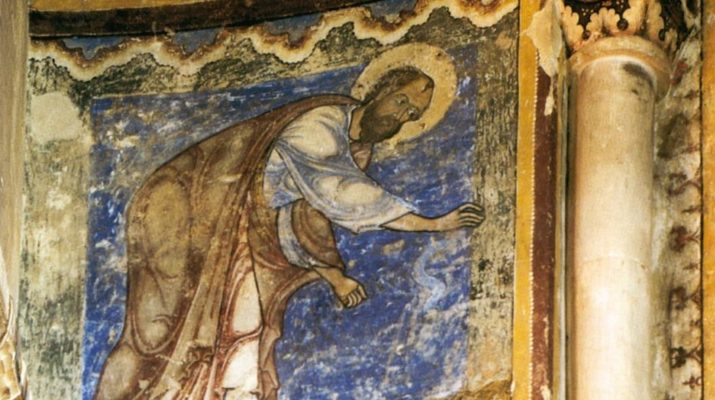2 Corinthians 5:20-6:10
Ash Wednesday ABC
20 So we are ambassadorsA for Christ,B since GodC is making his appealD through us; we entreatE you on behalf of Christ, be reconciledF to God.
A “ambassadors” = presbeuo. 2x in NT. From the same as presbuteros (elder); from presbus (old man). This is being older or mature. By extension, it is acting as a diplomat or representative. Can also be used figuratively to mean preacher. This shares a root with “Presbyterian.”
B “Christ” = christos. From chrio (consecrate by anointing with oil; often done for prophets, priests, or kings). Literally, the anointed one, Christ. The Greek word for Messiah.
C “God” = theos. From Proto-Indo-European origins, meaning do, put, place. This is God or a god in general.
D “making…appeal” = parakaleo. From para (beside, by, in the presence of) + kaleo (to call by name, invite, to name, bid, summon, call aloud) {related to keleuo (to command, order, direct); from kelomai (to urge on)}. This is to call to, summon, invite, request, or beg. It can also be exhort or admonish. Also, this can be encourage, comfort, or console. This word has legal overtones and is used of one’s advocate in a courtroom. It is the root of the name of the Holy Spirit “paraclete” is our advocate and comforter.
E “entreat” = deomai. From deo (to tie, bind, fasten, impel, compel; to declare something against the law or prohibited) This is having an urgent need because one is missing or needing something so it is an earnest appeal or pressing request.
F “be reconciled” = katallasso. 6x in NT. From kata (down, against, among) + allasso (to change, transform) {from allos (other, another; another of a similar kind or type)}. This is the reconcile, change, or exchange. It is a moment when two parties come together in reconciliation and both parties change as a part of it.
21 For our sake he made him to be sin who knewG no sin,H so that in him we might become the righteousnessI of God.
1 As we work together with him, we urgeJ you also not to acceptK the graceL of God in vain.M
G “knew” = ginosko. This is to know, recognize, realize, perceive, learn. It is knowledge gained through personal experience
H “sin” = hamartia. From hamartano (to miss the mark, do wrong, make a mistake, sin). Hamartano is from a (not) + meros (a part or share). Literally, this means not having one’s share or portion – like not receiving inheritance or what was allotted to you. This word means missing the mark so it is used for guilt, fault, and acts of sin.
I “righteousness” = dikaiosune. From dikaios (correct, righteous – implies innocent; this is that which conforms to God’s notion of justice, uprightness); From dike (the principle of justice; that which is right in a way that is very clear; a decision or the execution of that decision; originally, this word was for custom or usage; evolved to include the process of law, judicial hearing, execution of sentence, penalty, and even vengeance; more commonly, it refers to what is right); may be from deiknumi (to show, point out, exhibit; figurative for teach, demonstrate, make known). This is judicial or divine approval of character or action. This is righteousness, justice, justness, divine righteousness.
J “urge” = parakaleo. Same as “making…appeal” in v5:21 above.
K “accept” = dechomai. This is to warmly receive, be ready for what is offered, take, accept, or welcome. It is to receive in a literal or figurative sense.
L “grace” = charis. From chairo (to rejoice, be glad; used to say hello; properly, delighting in the grace of God or experiencing God’s favor); from char– (to extend favor, lean towards, be inclined to be favorable towards). This is grace, kindness, favor, gratitude, thanks. It is the sense of being inclined to or favorable towards – leaning towards someone to share some good or benefit. This can be literal, figurative, or spiritual. It is grace as abstract concept, manner, or action.
M “vain” = kenos. 18x in NT. Properly, this is something that is empty or void. Hence, it is worthless, foolish, ineffective, morally void, pretentious, unreal, or false.
2 For he says,
“At an acceptableN timeO I have listenedP to you,
and on a day of salvationQ I have helpedR you.”
See,S now is the acceptableT time; see, now is the day of salvation!
N “acceptable” = dektos. Related to “accept” in v6:1. 5x in NT. From dechomai (see note K above). This is something that is welcomed because it is favorable or desired. It is used figuratively for something that is propitious.
O “time” = kairos. This is season, opportunity, occasion. The word chronos is used for chronological time. Kairos is used for spiritually significant time – the right time or appointed time.
P “listened” = apakouo. 1x in NT. From epi (on, upon, at, what is fitting) + akouo (to hear, listen, understand by hearing). This is listening to favorably or attentively.
Q “salvation” = soteria. From soter (a savior, deliverer); from sozo (to save, heal, preserve, or rescue; taking someone from danger to safety; delivering or protecting literally or figuratively); from sos (safe, rescued, well). This is deliverance, salvation, preservation, welfare, prosperity, safety.
R “helped” = boetheo. 8x in NT. From boethos (helping or helper; one meeting urgent need); perhaps from boe (to cry, shout for aid; mimics the sound of a desperate shout for help with deep emotion); {from boao (cry out, make a distress call, ask for desperately need assistance); from boe (a cry, shout)} + theo (to run). This is running to help someone who has made an urgent call for help – coming to their rescue. Originally, this was used in a military context, but came to apply more generally to assistance in time of intense distress.
S “see” = idou. From eido (to be away, see, know, remember, appreciate). This is see! Lo! Behold! Look! Used to express surprise and or draw attention to the statement.
T “acceptable” = euprosdektos. Related to “accept” in v6:1 & “acceptable” in v6:2. 5x in NT. From eu (well, well done, good) + prosdechomai (to receive, await, expect, welcome; originally, welcoming a person into your home so receiving in a very personal way with reciprocity, hospitality; figuratively for endurance; can also mean awaiting with confidence or patience) {from pros (at, toward, advantageous for) + decohmai (see note K above)}. This is pleasing, favorable, approved, welcome, or well-received.
3 We are putting no obstacleU in anyone’s way, so that no fault may be foundV with our ministry,W 4 but as servantsX of God we have commendedY ourselves in every way: through great endurance,Z in afflictions,AA hardships,BB calamities,CC
U “obstacle” = proskope. 1x in NT. From proskopto (to strike against, stumble, beat on, be offended by; to sub your toe against; can also be the way water strikes against something – surging); {from pros (at, toward, advantageous for) + kopto (to cut, cut off, strike; can also be used for mourning or lamenting)}. This is offense, shock, something that causes one or another to stumble or, figuratively, to sin.
V “fault may be found” = momaomai. 2x in NT. From momos (blame, disgrace, blemish; literally a spot or blot; figuratively, something that harms a reputation or brings disgrace or blame that is unwarranted); perhaps from memphomai (to blame, find fault, see someone as worthy of blame, condemnable and rejected); perhaps from mempteos (rejected because condemned). This is someone or something that is disgraced because a fault or blemish has been found – to blame, slander, discredit, censure.
W “ministry” = diakonia. Perhaps from dia (through, across to the other side, thoroughly) + konis (dust) OR from dioko (to chase after, put to flight; by implication, to persecute or to purse like a hunter after its prey; this can be earnestly pursue or zealously persecute) {related to dio (put to flight)}. This is service, ministry, attending someone, service. It can mean serving someone at a table or otherwise as their servant/slave. It is also used for people who serve/minister in temples, as well as the work of Christian ministry. Figuratively, this word can mean money given for charity. This is shares a root with “deacon” and is where the word “diaconate” comes from.
X “servants” = diakonos. Related to “ministry” in v6:3. From dia (see note W above) + konis (see note W above). This is a servant, minister, waiter, or attendant. It is used for a person who performs a service, including religious service.
Y “commended” = sunistano. 16x in NT. From sun (with, together with, closely associated) + histemi (to stand, place, set up, establish, stand ready, stand firm, be steadfast). This is to establish, place together, prove, exhibit, demonstrate, commend, or approve. It can be standing together in the sense that the facts all line up to support a point or commend it. It can be set together in the sense of presenting or introducing something in a positive light.
Z “endurance” = hupomone. From hupo (by, under, about) + meno (to stay, remain, wait, await, continue, abide). This is properly to remain behind or remain under. It implies endurance, patience, steadfastness, and waiting in hope.
AA “afflictions” = thlipsis. From thlibo (to press in on and make narrow, rub together, constrict; figuratively to oppress or afflict). This is pressure that hems us in – used often of internal pressure that makes us feel like we have no other options and are confined or restricted. So, this is persecution, affliction, trouble, distress, and anguish. There is a different word, stenochoria, that refers to external pressure that we feel from what’s going on.
BB “hardships” = anagke. 18x in NT. From ana (up, again, anew) + agcho (to press tightly, compress) OR related to agkale (the arm, particularly one that is bent to carry a load). This is necessity – something that happens that requires an immediate response. It is generally associated with pain or distress.
CC “calamities” = stenochoria. 4x in NT. From stenos (narrow, confined) + chora (space, area). This is a narrow space – used figuratively for a difficulty coming from external pressure. It is distress, difficulty, or anguish.
5 beatings, imprisonments, riots,DD labors,EE sleepless nights, hunger;FF 6 by purity,GG knowledge, patience,HH kindness,II holinessJJ of spirit,KK genuineLL love,MM
DD “riots” = aktastasia. 5x in NT. From a (not, without) + kathistemi (set in order, put in charge, give someone authority to use force, designate, constitute); {from kata (down, against, among) + histemi (see note Y above)}. This is instability, disturbance, upheaval, confusion, or revolution. This term started as a political one, but is also used in a moral sense. It is an upheaval that creates confusion.
EE “labors” = kopos. Related to “obstacle” in v6:3. 18x in NT. From kopto (see note U above). This is trouble, toil, or labor. This is working to the point of exhaustion or weariness. At base, this refers to a blow that lands so swiftly that one is seriously weakened. Figuratively, this is being greatly tired or working to the point of being without strength.
FF “hunger” = nesteia. 6x in NT. From nesteuo (to fast, not eat food, to make a religious fast); {from a (not, without) + esthio (to eat or figuratively to devour or consume like rust)}. This is fasting or being hungry for want of food. It is also used specially for the fast that accompanies the day of atonement.
GG “purity” = hagnotes. 2x in NT. From hagnos (holy, sacred, pure ethically, ritually, or ceremonially; prepared for worship, chaste, unadulterated, pure to the core; undefiled by sin; figurative for innocent, modest, perfect). This is purity or chastity. It is purity in one’s essence, which is to say, integrity, blamelessness.
HH “patience” = makrothumia. 14x in NT. From makros (long, long lasting) {from mekos (length); probably related to megas (great or large)} + thumos (passion, wrath; actions emerging from passion or impulse) {from thuo (to rush along, breathe violently, offer sacrifice)}. Properly, this is long-passion or long-suffering – one who waits the needed amount of time before expressing anger. This is also patience, perseverance, and fortitude.
II “kindness” = chrestotes. 10x in NT. From chrestos (useful, good, well-fitted, benevolent, kind, gracious; also a name given to slaves in the ancient world); from chraomai (to use, make use of, give what is needed, act in a specific way, request). This is properly useable, good or ready for service – just what one needs to meet real needs. Figuratively, this speaks of moral excellence, strong character, uprightness, kindness, integrity.
JJ “holiness” = hagios. Related to “purity” in v6:6. From hagnos (see note GG above). God is totally different from humanity and thus set apart. That which is consecrated to worship God (elements of worship) or to serve God (as the saints) are holy because they are now set apart for God’s purposes. Holy because important to God. This is sacred physically, pure. It can be morally blameless or ceremonially consecrated.
KK “spirit” = pneuma. From pneo (to blow, breath, breathe hard). This is wind, breath, or ghost. A breeze or a blast or air, a breath. Figuratively used for a spirit, the human soul or part of us that is rational. It is also used supernaturally for angels, demons, God, and the Holy Spirit. This is where pneumonia comes from.
LL “genuine” = anupokritos. 6x in NT. From a (not, without) + hupokrinomai (to answer, pretend, respond as an actor on stage; figuratively, to lie) {from hupo (by, under, about) + krino (to judge, decide, think good, condemn, determine, pass judgment, stand trial, sue; judging whether in court or in a private setting; properly, mentally separating or distinguishing an issue – to come to a choice or decision, to judge positively or negatively in seeking what is right or wrong, who is innocent or guilty; can imply trying, condemning, punishing, or avenging.)} Properly, this is unhypocritical – not phony. It speaks to actions that are sincere and genuine without guile.
MM “love” = agape. This is love, goodwill, benevolence. It is God’s divine love.
7 truthfulNN speech,OO and the powerPP of God; with the weaponsQQ of righteousness for the right hand and for the left; 8 in honorRR and dishonor,SS in ill repute and good repute. We are treated as impostors,TT and yet are true;UU
NN “truthful” = aletheia. From a (not, without) + lanthano (unnoticed, concealed). Truth is literally that which is not or cannot be concealed. This word covers more than the sense of true versus false. It spoke of truth as that which corresponds to reality – reality as opposed to illusion. Thus, it includes, sincerity, straightforwardness, and reality itself.
OO “speech” = logos. Related to “says” in v6:2. From lego (to speak, tell, mention). This is word, statement, speech, analogy. It is a word that carries an idea or expresses a thought, a saying. It could refer to a person with a message or reasoning laid out in words. By implication, this could be a topic, line of reasoning, or a motive. It can be used for a divine utterance or as Word – Christ.
PP “power” = dunamis. From dunamai (to be able, have power or ability). This is might, strength, physical power, efficacy, energy, and miraculous power. It is force literally or figuratively – the power of a miracle or the miracle itself.
QQ “weapons” = hoplon. 6x in NT. This is an implement, tool, instrument, armor, or weapon. It is used literally and figuratively.
RR “honor” = doxa. From dokeo (to have an opinion, seem, appear, suppose; a personal judgment; to think); from dokos (opinion). This is literally something that evokes a good opinion – something that connects to our understanding of intrinsic worth. The ultimate expression of this is, of course, God and God’s manifestation. So, this is opinion, honor, and dignity, but also praise, glory, renown, and worship.
SS “dishonor” = atimia. 7x in NT. From a (not, without) + time (value, price, honor; honor as it is perceived by another or willingly granted by another; mark or respect, price, precious value, esteem, dignity); {from tio (to honor, pay respect to, value)} OR from tino (to pay a penalty or fine). This is dishonor or disgrace, shame, reproach, or common use. It is something that as seen as having no value.
TT “impostors” = planos. 5x in NT. This is wandering about as someone without a home. It implies someone who would lead astray, a deceiver, misleader, or impostor.
UU “true” = alethes. Related to “truthful” in v6:7. From a + lanthano (see note NN above). This is true, unconcealed; true because it is in concert with fact and reality – attested. Literally, what cannot be hidden; truth stands up to test and scrutiny and is undeniable, authentic
9 as unknown,VV and yet are well known; as dying, and see—we are alive; as punished,WW and yet not killed; 10 as sorrowful,XX yet always rejoicing;YY as poor,ZZ yet making many rich; as having nothing, and yet possessing everything.
VV “unknown” = agnoeo. Related to “knew” in v5:21 & “knowledge” in v6:6. From a (not, without) + the same as ginosko (see note G above). This is being ignorant, unknown, unaware. It can be willful ignorance as well.
WW “punished” = paideuo. 13x in NT. From pais (child, youth, servant, slave); perhaps from paio (to strike or sting). Properly, this is training or teaching children so it is educate, correct, discipline, and punish. This is the root of “pedagogy.”
XX “sorrowful” = lupeo. From lupe (pain, whether physical or mental; grief, sorrow, distress, a heavy heart). This is to be sad, grieve, distress, hurt, feel pain. It can be used for deep pain or severe sorrow as well as the pain that accompanies childbirth.
YY “rejoicing” = chairo. From char- (to extend favor, lean towards, be inclined to be favorable towards). This is to rejoice, be glad or cheerful; a greeting. This is the root verb that the Greek word for “grace” comes from (charis).
ZZ “poor” = ptochos. From ptosso (to crouch or cower as a beggar does). This is poor or destitute – someone who is extremely power and bowed down because of a long struggle under poverty. Properly, it means bent over so figuratively it is someone who is deeply destitute and lacking tangible resources. This is a beggar – as extremely opposite a wealthy person as possible.
Image Credit: “Paul Throwing a Snake into the Fire” by unknown artist, circa 1180.




